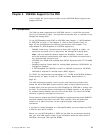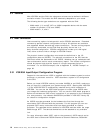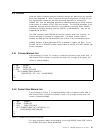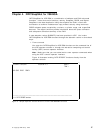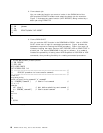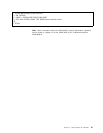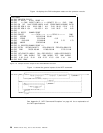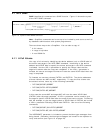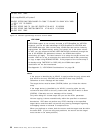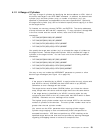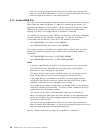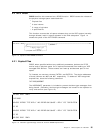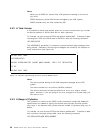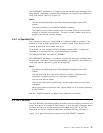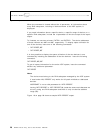
4.1 IXFP SNAP
SNAP identifies this command as a SNAP function. Figure 12 shows the syntax
of the IXFP SNAP command.
┌┐─,───────────────────────────────────────────────────────────────
──IXFP─ ─── ───SNAP, ──┬ ┬───
┴source ──┬ ┬─────────────────── :target ──┬ ┬──────── ──┬ ┬───────────── ──┬ ┬─────────── ────────
│ │└┘──(scyl ──┬ ┬──-scyl )└┘──(tcyl)└ ┘──,VOL1=volid └┘──,NOPROMPT
│ │└┘──.ncyl
└ ┘──source(DSN=′ data-set-name′):target ──┬ ┬──────── ─────────────────────
└┘──(tcyl)
Figure 12. Syntax of IXFP SNAP Command
Note: SnapShot commands can be set up to be invoked by end users as well as
by database administrators and system programmers.
There are three ways to do a SnapShot. You can take a copy of:
•
A full volume
•
A range of cylinders
•
A non-VSAM file
4.1.1 A Full Volume
You copy a full volume by identifying the device address (cuu) or VOLID label of
the source and target in the IXFP SNAP command. Intermixing of the device
address and VOLID label to specify the source and target in the IXFP command
is allowed. Use the VOL1= parameter to specify the volume label that the
target will assume after the copy has completed. If the VOL1= parameter is
omitted, the source and target volumes will have the same VOLID label when the
copy is completed.
To illustrate, we use two volumes: PATEV1 and PATEV2. The device addresses
of these volumes are 80E and 80F, respectively. To copy the first volume onto
the second volume, issue any of the following commands:
•
IXFP SNAP,80E:80F,NOPROMPT
•
IXFP SNAP,PATEV1:PATEV2,NOPROMPT
•
IXFP SNAP,PATEV1:80F,NOPROMPT
In this case the source 80E and target 80F will have the same VOLID label
(PATEV1) after the snap completes. A VOL1= parameter can be used to give
the target a specific VOLID label after the snap of the source volume. Continuing
with the example, to give the target volume a VOLID label of PATEV3, we include
a VOL1= parameter indicating VOLID label PATEV3. Use one of the following
commands;
•
IXFP SNAP,80E:80F,VOL1=PATEV3,NOPROMPT
•
IXFP SNAP,PATEV1:80F,VOL1=PATEV3,NOPROMPT
The NOPROMPT parameter is included to prevent decision-type messages from
being issued. Otherwise, decision-type messages are issued for the operator to
verify and confirm (see Figure 13 on page 22).
Chapter 4. IXFP/SnapShot for VSE/ESA 21



